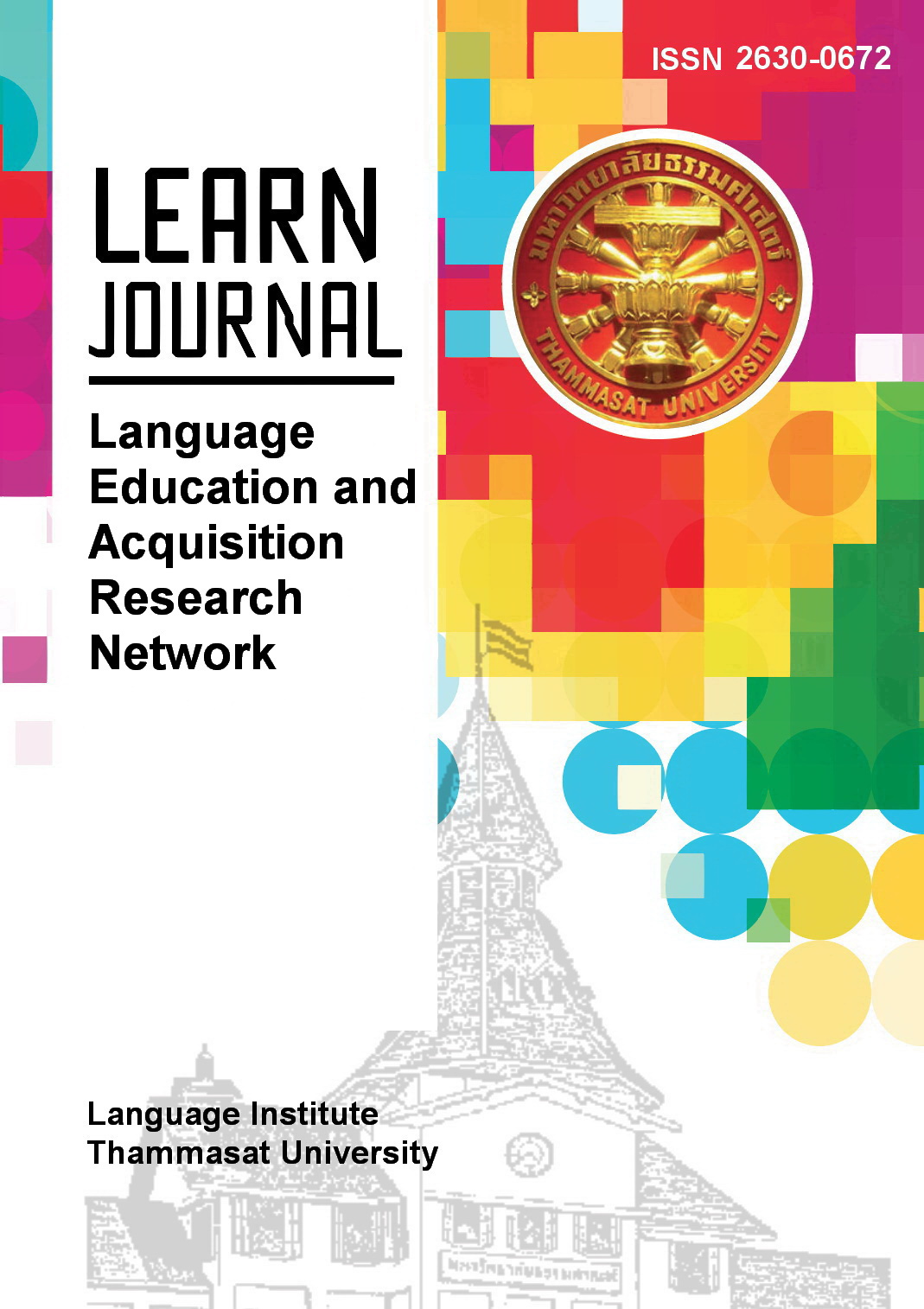How to Express Gratitude in the Acknowledgement Section: The Case of Thai EFL Graduate Students
Main Article Content
Abstract
Completing a postgraduate dissertation requires various types of support, whether it be academic, moral, or financial. One way to express gratitude towards those who contribute is through the acknowledgement section. However, the guidelines provided by universities appear to be inadequate to support students, which poses challenges for those who are non-native English speakers. The present study, therefore, aims to examine the generic structure of the move patterns and the frequency of moves in the acknowledgement sections written by Thai EFL graduate students in applied linguistics. A corpus of 60 acknowledgements from the e-databases of two public universities was compiled. Hyland’s (2004) framework of dissertation acknowledgements, consisting of three moves with their sub-units, was adopted as the analytical framework. The findings revealed that the thanking move appeared in every acknowledgement and was thus regarded as an obligatory move. However, both the reflecting and announcing moves were considered optional moves. Interestingly, one new move was found, suggesting a specific characteristic of Thai EFL graduate students in composing this section. The findings have pedagogical implications for both English for Academic Purposes (EAP) teachers and students in terms of raising their awareness of the diverse acknowledgement patterns that they can utilise.
Article Details
References
Amnuai, W., & Wannaruk, A. (2013). Investigating move structure of English applied linguistics research article discussions published in international and Thai journals. English Language Teaching, 6(2), 1-13. http://dx.doi.org/10.5539/elt.v6n2p1
Biber, D., Connor, U., & Upton, T. A. (2007). Discourse on the move: Using corpus analysis to describe discourse structure. John Benjamins Publishing.
Borlongan, A. M. (2017). Dissertations acknowledgements in Philippine English. Komaba Journal of English Education, 8, 15-35. https://www.researchgate.net/publication/323725229_Dissertation_acknowledgements_in_Philippine_English
Bunton, D. (2014). Generic moves in PhD thesis introductions. In J. Flowerdew (Ed.), Academic discourse (pp. 67-85). Routledge.
Connor, U., Upton, T. A., & Kanoksilapatham, B. (2007). Introduction to move analysis. In D. Biber, U. Connor, & T. A. Upton (Eds.), Discourse on the move: Using corpus analysis to describe discourse structure (pp. 23-41). John Benjamins.
Cotos, E., Link, S., & Huffman, S. (2016). Studying disciplinary corpora to teach the craft of Discussion. Writing and Pedagogy, 8(1), 33-64.
Cortes, V. (2013). The purpose of this study is to: Connecting lexical bundles and moves in research article introductions. Journal of English for academic purposes, 12(1), 33-43.
Cronin, B., & Overfelt, K. (1994). The scholar's courtesy: A survey of acknowledgement behaviour. Journal of Documentation, 50(3), 165-196. https://doi.org/10.1108/eb026929
Darabad, A. M. (2016). Move analysis of research article abstracts: A cross-disciplinary study. International Journal of Linguistics, 8(2), 125-140.
Dudley-Evans, T., & St. John, M.J. (1998). Developments in English for Specific Purposes: A multi-disciplinary approach. Cambridge University Press.
Giannoni, D. S. (2002). Worlds of gratitude: A contrastive study of acknowledgement texts in English and Italian research articles. Applied Linguistics, 23(1), 1–31. https://doi.org/10.1093/applin/23.1.1
Hyland, K. (2003). Dissertation acknowledgements: The anatomy of a Cinderella genre. Written Communication, 20, 242-268.
Hyland, K. (2004). Graduates' gratitude: the generic structure of dissertation acknowledgements. English for Specific Purposes, 23(3), 303–324. https://doi.org/10.1016/S0889-4906(03)00051-6
Hyland, K., & Tse, P. (2004). “I would like to thank my supervisor”. Acknowledgements in graduate dissertations. International Journal of Applied Linguistics, 14(2), 259-275.
Jia, M., & An, Y. (2022). Language as an interpersonal marker in English dissertation acknowledgments: Variations across genres and academic disciplines. English Today, 1. https://doi.org/10.1017/S026607842200027X
Kanoksilapatham, B. (2005). Rhetorical structure of biochemistry research articles. English for Specific Purposes, 24(3), 269-252. http://dx.doi.org/10.13140/RG.2.1.5108.9365
Kanoksilapatham, B. (2015). Distinguishing textual features characterizing structural variation in research articles across three engineering sub-discipline corpora. English for Specific Purposes, 37, 74-86. https://doi.org/10.1016/j.esp.2014.06.008
Jaroenkitboworn, K. (2014). A Study of English Acknowledgements written by EFL Thai learners. PASAA: Journal of Language Teaching and Learning in Thailand, 47, 97-128.
Kurniawan, E., & Sabila, N. A. A. (2021). Another look at the rhetorical moves and linguistic realizations in international and Indonesian journal articles: A case study of tourism research article abstracts. Indonesian Journal of Applied Linguistics, 11(2), 381-329. https://doi.org/10.17509/ijal.v11i2.32055
Nkemleke, D. A. (2006). Nativization of dissertation acknowledgements and private letters in Cameroon. Nordic Journal of African Studies, 15, 166–184.
Paul-Hus, A, & Desrochers, N. (2019). Acknowledgements are not just thank you notes: A qualitative analysis of acknowledgements content in scientific articles and reviews published in 2015. PLoS One. 14(12), Articlee0226727. https://doi: 10.1371/journal.pone.0226727.
Pratiwi, S. N., & Kurniawan, E. (2021). Rhetorical move and genre knowledge development of English and Indonesian abstracts: A comparative analysis. Studies in English Language and Education, 8(3), 885-900.
Santos, M. B. D. (1996). The textual organization of research paper abstracts in applied linguistics. Text, 16, 481-499. https://doi.org/10.1515/text.1.1996.16.4.481
Swales, J. M. (1981). Aspects of article introductions. Birmingham, UK: The University of Aston, Language Studies Unit.
Swales, J. M. (2004). Research genres: Explorations and applications. Cambridge University Press.
Swales, J., & Feak, C. (2000). English in today’s research world: A writing guide. University of Michigan Press.
Yang, W. (2012). A genre analysis of PhD dissertation acknowledgements across disciplinary variations. LSP Journal, 3(2), 51-70.
Yang, R. & Allison, D. (2003). Research articles in applied linguistics: Moving from results to conclusions. English for Specific Purposes, 22(4), 365-385.
Zare-ee, A., & Hejazi, Y. (2019). Acknowledgement structure in Persian and English theses and dissertations: A contrastive genre analysis. Arab World English Journal (AWEJ), 10(1), 347-360. https://dx.doi.org/10.24093/awej/vol10no1.29


